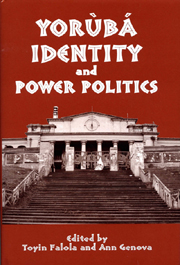Book contents
- Frontmatter
- Contents
- List of Illustrations
- Introduction
- Part I Writing Yorùbá
- Part II Chiefs and Tradition
- 8 Power, Status, and Influence of Yorùbá Chiefs in Historical Perspective Toyin Falola
- 9 Chieftaincy Structures, Communal Identity, and Decolonization in Yorùbáland
- 10 Odogbolu Chieftaincy Dispute in Historical Perspective
- 11 Yorùbá Nationalism and the Reshaping of Ọbaship
- Part III Identity and Modern Politics
- Notes on the Contributors
- Index
11 - Yorùbá Nationalism and the Reshaping of Ọbaship
from Part II - Chiefs and Tradition
Published online by Cambridge University Press: 12 September 2012
- Frontmatter
- Contents
- List of Illustrations
- Introduction
- Part I Writing Yorùbá
- Part II Chiefs and Tradition
- 8 Power, Status, and Influence of Yorùbá Chiefs in Historical Perspective Toyin Falola
- 9 Chieftaincy Structures, Communal Identity, and Decolonization in Yorùbáland
- 10 Odogbolu Chieftaincy Dispute in Historical Perspective
- 11 Yorùbá Nationalism and the Reshaping of Ọbaship
- Part III Identity and Modern Politics
- Notes on the Contributors
- Index
Summary
In 2003, Claude-Helene Perrot and F.-X. Faubelle-Aymar published Le retour des rois, subtitled Les autorités traditionelles et l'État en Afrique contemporaine, taken from a conference held in Paris in 1999. According to this volume, it is necessary to reconsider the role of kings and chiefs in contemporary African societies 40 years after independence. Since the 1980s, there has been a reexamination of the previously accepted model, which postulates a dichotomy between, on the one hand, modernity, represented by the various elites who took over the control of the modern states, and on the other hand, “tradition,” symbolized by the historical chiefs. These analyses have been challenged by new ones underlining “a reciprocal mode of incorporation” or of “a reciprocal process of assimilation” by these two groups.
Whereas the new African elites have seen ọbas and chiefs merely as the relics of a past to be fought or forgotten, and social science researchers themselves have described a dissolution of the monarchical institutions and a marginalization of historical elites, today contemporary synergies and new interrelations between these two groups have to be studied. The latest manifestation is the emergence of the “syncretic leader,” who embodies formerly antagonistic legitimacies of power. More specifically, a syncretic leader emerges when an academic, a high civil servant, a diplomat, or a businessman is elected ọba by his community's kingmakers.
However, the conferment of ọbaship on a man whose profile embodies both modernity and the membership of a royal family is not new in itself in Yorùbá-speaking areas.
- Type
- Chapter
- Information
- Yorùbá Identity and Power Politics , pp. 205 - 228Publisher: Boydell & BrewerPrint publication year: 2006



